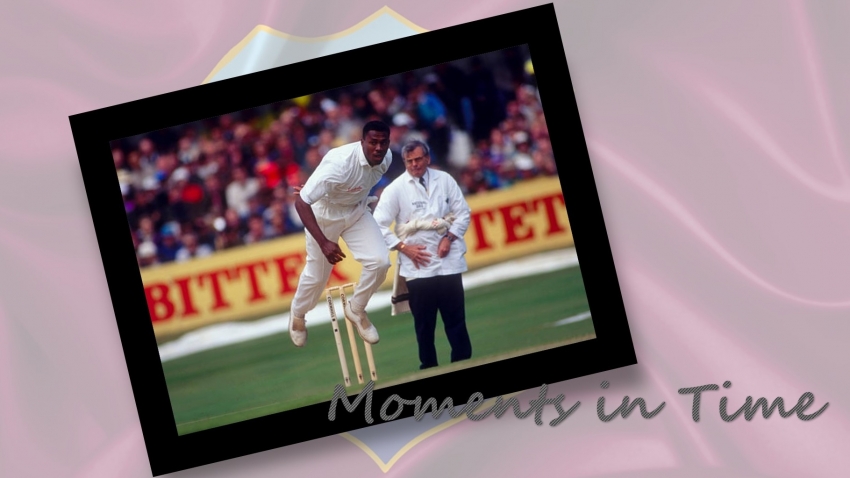
Moments in Time: The day Ian Bishop showed he was still a destroyer
by Paul-Andre WalkerIn 1993 the West Indies went into the fifth and final Test of a series against Australia at Perth tied at 1-1 and a number of brilliant performances made the game a one-sided affair, giving the visitors a not-so-close 2-1 victory.
Australia had, since 1990 and the steady slowing of the conveyor belt of great fast bowlers emanating from the West Indies, slowly been establishing themselves as the best Test side in the world but on that January 30, they would be reminded that the Caribbean side weren’t done just yet.
The last great fast bowler of the era was a tall, slim, dangerously quick Trinidadian by the name of Ian Bishop.
Bishop would go on to become one of the foremost voices of cricket from the region, erudite and eloquent, with a calmness of commentary only broken by the absolutely sublime.
But when he made his Test debut in 1989, he spoke the language of pace.
Pace is like a touchstone for batsmen. It will tell you exactly who you are. It will hint at your mortality and force you to face all your fears - in about .43 of a second.
As a 22-year-old debutant in ‘89 Bishop was feared but by the time 1993 had come around he had twice pulled up with serious back injuries and had to reform his action, running in more chest on than the dangerous side-on action that created his whip and pace and maybe some of his away-swing.
By 1993, Bishop, back on the international scene, had much to prove.
On February 1, he proved it.
Before that though, choosing to bat first on a fast, bouncy Perth pitch, Australia were devastated by a Curtly Ambrose spell of bowling that would be remembered even now, some 27 years later.
The tall, lanky, mean mug of a pacer aided by Bishop’s removal of Justin Langer and Steve Waugh at the top of the innings, tore into the Australians, dislodging David Boon for 44 while accounting for Mark Waugh, Damien Martyn, Alan Border, Ian Healy, Merv Hughes and Jo Angel.
In the wake of the destruction where Border, Healy, Hughes, and Angel went without scoring, Ambrose would end with figures of 7-25, while Bishop watched from the other end with 2-17.
The only man not to fall to the pair was Shane Warne, who was run out for 13.
Australia were routed for 119 and had to watch as the West Indies ended day one on 135-1, with Brian Lara on 16 and Phil Simmons on 45.
Already trailing, Australia would get to work on the second day, removing Lara without the Little Prince adding to his overnight score.
However, there was another roadblock as Keith Arthurton would score an obdurate 77, while Simmons would go on to make 80. Junior Murray’s 37 helped to push the score to 322 and though the Australians were 203 runs adrift, their batting line-up had in it, all the tools to turn the game back in their favour.
Bishop made sure that wasn’t to be.
Again, the partnership of Bishop of Ambrose was significant, with the latter removing Langer for one. Bishop made light work of Steve Waugh, who failed to score, and his brother, Mark, for just 21.
Warne, sent out as nightwatchman on day two, did not have a very long vigil, as Ambrose had him caught behind without scoring.
Boon was again in a defiant mood and was 45 not out at the end of day two, while Martyn, who was forced to come out after Warne’s demise was on three, with Australia well and truly reeling at 75-4, still 128 runs in arrears.
Bishop had taken two and Ambrose had taken two when proceedings began on the third day, but apart from Walsh, who had Hughes caught behind for 22 late in the innings, and Anderson Cummins, who put an end to Martyn’s defiance, the day belonged to Bishop.
The pacer bowled Boon for 52, bowled border without scoring for a king pair and had Ian Healy caught behind for 27 before accounting for last man out, Craig McDermott, caught at slip by Lara for eight.
Interestingly, at the start of the Test, Border, Australia's greatest ever all-rounder, needed just 50 runs to go past India's Sunil Gavaskar as the man who had scored most runs in Tests. He would have to wait for that privilege.
Of course, Ambrose, for his 7-25 and 2-54, was man of the match, but the performance of Bishop was important in telling the world, he was back. His match figures of 8-57 roared loudly. The West Indies weren’t done yet and they still had the Frank Worrell Trophy.